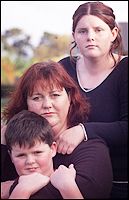'Spare parts' donation saves 3 lives

Lisa Purvis with children Kirsty and DJ. Picture / Greg Bowker
23.05.2003
By ELIZABETH BINNING
When Stephen Purvis died, he gave life to three dying people.
His heart was donated to a man who had less than 48 hours to live. His lungs went to a dying woman. His liver went to another man in his early 50s.
In all, more than a dozen people benefited from what Mr Purvis had once described as "spare parts".
Now, as New Zealand grapples with a low rate of organ donors, his widow, Lisa, is putting all her effort into raising public awareness about organ donation.
This week the shortage of donors was again highlighted when the Ministry of Health turned down an offer to be involved in an awareness commercial, supported by film-maker Peter Jackson.
About 400 New Zealanders are waiting for organs, but the donor shortage means many of those people will not live long enough to receive that much-needed heart, lung or liver.
Mrs Purvis said there was a lot of misinformation about organ donation, especially on who had the final say, and that needed to be addressed.
Her husband was a strong advocate of the scheme and he made sure his wishes were expressed to his family and on his driver's licence.
"He would say if for some reason he was brain dead and was going to die, donate, donate, donate. That was the kind of guy he was."
So, when the worst happened last year after an accident, Mrs Purvis was shocked to learn that her husband's wishes meant nothing. A driver's licence is not legally binding. Doctors must still get family approval to remove organs.
Mrs Purvis said she was grateful she and her husband had discussed what they wanted should something happen to one of them.
"It made it so much easier because I knew straight away what to do."
The Waikato woman said an awareness campaign would help to educate people.
"They don't know the process. They think it's awful and that they [the deceased] are treated like a piece of meat, but that's not the case at all."
Mrs Purvis said hospital staff ensured she and her family were fully aware of the transplant process and what would happen after the organs were taken.
The family were greatly relieved to learn that the body would look the same.
"We donated all these organs and they took everything, but when we went to look at him we could never tell," Mrs Purvis said.
The process of confirming death and preparing for transplant also gave the family valuable time to say goodbye.
"We had the chance to sit there and talk to him and hold him."
Mrs Purvis said dealing with the sudden loss of a loved one was always difficult, but her family's experience was made slightly easier by the knowledge that Stephen's death had helped others.
"It's the most exhilarating feeling that he had not died in vain, that he did something to help those people."
The couple's children, 14-year-old Kirsty and 12-year-old DJ, are proud of what their dad did.
"I actually think that it was the right thing to do because he didn't need the organs any more and he could help [people]," said Kirsty.
Mr Purvis' death has educated many of his extended family and friends about organ donation.
His mother-in-law, Jan Symes, said: "If we don't know, we presume the worst. It's the ghoulish side of it - a lack of information. I was very, very anti-donation, but I have learned such a lot. I'm now thinking of changing my licence."
Courtesy of the New Zealand Herald - 23 May 2003
back to top
| 



